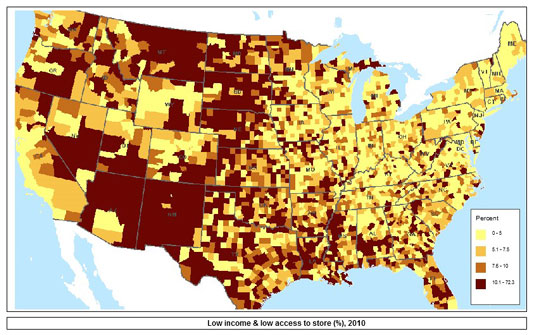
Food apartheid in the United States (PC: https://www.ruralhealthinfo.org/topics/food-and-hunger)
Food apartheid – or the lack of access to healthy, affordable food in low-income communities of color – is at the intersection of social, political, and economic discrimination, making it one of the nation’s most pressing social justice issues. According to a 2009 USDA ERS (Economic Research Service) report, roughly 11.5 million people reside in low-income areas that lack a supermarket within a 1-mile radius in the United States. Instead, these neighborhoods are littered with fast food restaurants and convenience stores, which mainly provide high-calorie, processed foods. Consequently, food apartheid is associated with an increased prevalence of health conditions, especially cardiovascular disease, diabetes, and obesity, further emphasizing the importance of adequately addressing this problem. A variety of solutions, ranging from policy proposals to community efforts, have been implemented across the United States. For example, South Los Angeles enforced a ban on the construction of new fast food restaurants in 2008 to address the high rates of obesity observed in its residents. Furthermore, community gardens and farms, such as the one located by The Scrap Exchange in Durham, aim to increase access to healthy, nutritious food for low income families. In this paper, I hope to analyze the various solutions proposed to end food apartheid in the United States with the help of specific case studies.